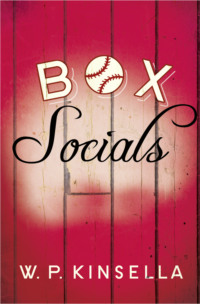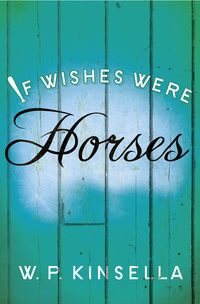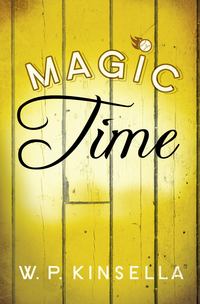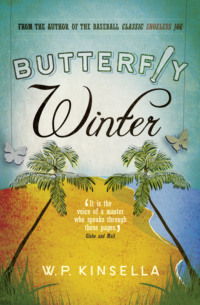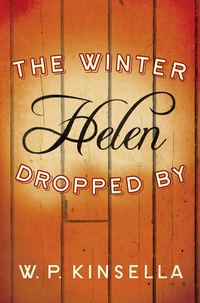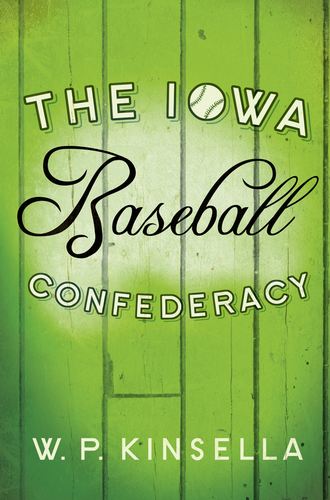
Полная версия
The Iowa Baseball Confederacy
To say that my father was regarded as an eccentric in those years after he became obsessed with the Confederacy would be mild understatement. Luckily, eccentrics were tolerated, even encouraged, in small Iowa towns. ‘Like father, like son,’ the people of Onamata say about me. ‘That Gideon Clarke is a right odd fellow,’ they say, ‘but he comes by it honestly.’ I think they whisper about me more than they did about my father because I don’t work steadily, a cardinal sin in America’s industrious heartland. Thanks to my mother and sister, I have more money than I will ever need.
But to the story. As I’ve explained, my father was carrying his graduate school application in his back pocket the dreamy August evening he felt compelled to travel to Iowa City and take in the Gollmar Bros. Carnival and American Way Shows. As he approached through the parking lot he could see that the carnival was a small, sorry operation: rusty, square-fendered trucks were mired in a confusion of mud and cables. Behind the trucks was a string of blunt-nosed buses with bulging tires, some with frayed curtains at their windows. Portable generators, which powered the frail carousel and the paint-freckled Ferris wheel, roared deafeningly.
As Matthew set out for Iowa City that day he’d had the feeling that there were presences all about him, that there was hidden life in the poplar leaves that fluttered alluringly in the yard; he’d turned back toward the house once, as if beckoned by the group of slim hollyhocks that stood under the bedroom window at the side of the building. For a few seconds Matthew had thought he could hear them humming to a mysterious military music. The hollyhocks were surrounded by cosmos, themselves tall. The pale pink, wine, and mauve cosmos, peering from the frilly green lace that was their leaves, looked like delicate children appealing to a parent. Matthew stood absolutely still for several moments, staring at the tableau, waiting expectantly. There was something about the flowers; he had the feeling they wanted to speak to him.
During the drive to Iowa City, Matthew had thought he’d seen an Indian walking in the ditch, loping along with enormous strides, an Indian wearing only a breech-cloth. But as he came abreast of the spot he’d seen that it was just a trick played by the sun as it slanted through the emerald cornstalks.
Matthew slouched down the midway, his hands deep in his pockets, his dark eyes, though downcast, taking in everything. He stared and stared at the rides and the booths. He spent no money. The trampled and muddy grasses of the fairgrounds were frosted with cedar shavings, and their perfume filled the air. Matthew craned his neck, brushed stubborn curls from his forehead, stopped and scrutinized a brightly lit booth where a pyramid of milk bottles repelled puffy baseballs, until he was certain the booth held nothing of significance.
As he continued along the midway he eyed the banner advertising the obligatory girlie show, DARLIN’ MAUDIE was painted in garish red letters across a canvas banner; at each end of the banner was the same drawing of a girl with rosebud lips, sporting a 1920s hairdo. The drawing ended at the girl’s navel. She was clad in a silky red blouse, vaguely Chinese in nature. The fingers of each hand gripped the scream-red material as if she were about to tear the blouse wide open, EXOTIC! DARING! REVEALING! NAUGHTY! was printed in smaller capitals under the main headline.
Matthew noticed that the barker for the Darlin’ Maudie show was not attracting many patrons, partly because his voice could not be heard above the thundering generators, and partly because it was wartime and the sparse crowd was made up mainly of women and children. What few men were present were middle-aged or older and had women and children in tow.
After watching the barker for a moment, Matthew cut between the girlie-show tent and a barrel-like wooden structure where motorcycle daredevils rode only inches away from multiple fractures. As he rounded the corner of the tent he could hear arguing voices. He continued to the back of the tent, and there he saw Darlin’ Maudie standing at the top of some makeshift stairs, just opposite the door to a tiny, aluminum-colored trailer that appeared to be held together by rust. The first thing he noticed was her mouth. It was wide and sensuous, nothing like a rosebud. She was dressed in celery-colored satin pantaloons, the kind worn by harem girls in the movies. She had on the same blouse as the girl on the banner, only all the buttons were tightly closed, each snap surrounded by what dressmakers called a frog.
Darlin’ Maudie was pointing accusingly and cursing as if a cow had just stepped on her. The man at whom she was cursing had a red, moon-shaped face. His wiry hair was brushcut; he wore construction boots, jeans, and a soiled white T-shirt, which humped out over a sizable beer belly.
‘No matter what you say, you can’t make me do it,’ Darlin’ Maudie was shrieking. ‘You … ’ She reeled off every curse Matthew had ever heard, plus a few totally new to him.
‘If you don’t do it today, you’ll do it tomorrow,’ drawled the crew-cut. While Maudie whirred curses at his back like poisonous darts from a blowgun, the man ambled away, his boots making sucking sounds in the mud.
Darlin’ Maudie eventually turned back toward the trailer, and as she did she saw Matthew standing there wide-eyed as an orphan in front of a magician, one hand gingerly touching the rusting metal.
‘What do you want?’ she said, making her dark eyes large in an imitation of Matthew’s surprised stare as she produced a pack of cigarettes from somewhere on her body. Matthew stood rooted to the spot, gaping up at her as she lit a Philip Morris and inhaled deeply. Matthew knew he must look like a farm boy staring at his first skyscraper. But the odors that floated slowly in the sultry air had enchanted him – the tangy shavings, the burning-oil smell of the generators, Maudie’s perfume, the acrid odor of her cigarette.
‘Can I do anything to help you?’ Matthew finally stuttered. He pictured himself astride a shining steed, his lance turned orange by the setting sun.
‘What are you, a cop?’ said Darlin’ Maudie.
‘You sounded as if you were in some kind of trouble,’ said Matthew.
‘Nothin’ I can’t handle,’ she said, still eyeing him suspiciously. The sun sparked off her blue-black hair. She wore one large ringlet at the front of each ear. After a few seconds she smiled, showing small, even teeth with delicate spaces between. ‘Yeah, you can do something for me,’ she said, still smiling. ‘You can carry me someplace where I can set my feet down on solid land. I can’t get these goddamned shoes dirty.’ She pointed with her cigarette at the high-heeled red pumps, the same color as her blouse.
Matthew, his breath constricted with love, knowing the color was rising up his neck like mercury in a thermometer, stepped forward, his own shoes sinking uncomfortably deep in the mire.
‘I won’t have to carry you far,’ he said. ‘Your trailer’s parked in a low spot.’
‘We’ll see who does what,’ Maudie said defiantly as she stepped carefully down the rickety steps and deposited herself in Matthew’s arms. He carried her across the lot and fifty yards up an embankment to the edge of a cornfield.
‘Thanks,’ said Darlin’ Maudie, looking carefully at her benefactor for the first time. ‘What’s your name?’
‘Matthew.’
‘Your friends call you Matt?’
‘No. They call me Matthew.’
‘I might have figured,’ she said, making her eyes large again. Then she spotted a wide, squat tree about a hundred yards into the cornfield. ‘Let’s go in there,’ she said. ‘It looks so peaceful.’
The corn was armpit high and the field smelled fresh as dawn. Darlin’ Maudie tested the earth with one crimson shoe.
‘I told you it would be dry up here,’ Matthew said, and taking her hand he led her toward the tree.
The tree sat like a party umbrella, trunk sturdy, branches gently arching. Wild grasses grew around the base of the tree, where roots ridged above the soil like exposed veins.
They sat down on the grass, Matthew picking away twigs and pieces of fallen bark so Darlin’ Maudie wouldn’t dirty her exotic costume.
The corn swaddled the noise of the carnival. They could feel the rhythm of the generators, thumping away like distant music.
‘This is so quiet,’ Maudie said, looking tiny and frightened, a ragamuffin of a girl lifted out of her noisy and reverberating environment and deposited amid the silent corn. ‘I ain’t been anywhere quiet for months and months, since we left Florida in the spring.’
Matthew could see her shoulder blades chopping at the material of her blouse. As his gaze flashed across her black eyes, he saw that she had a beauty spot on her cheek, about an inch to the right of her mouth. He couldn’t tell if it was real or painted on, but he felt himself salivating. He was mad to caress the mysterious spot with his tongue. Maudie smiled again and he counted the spaces between her lower teeth. He held out his arms to her, tentatively, afraid she would laugh rudely or ridicule him. She moved close, there under the canopy of leaves, but with her head down so there wouldn’t be any kiss. She rested her head on his chest as he put one hand on her upper arm, which was so thin he felt as if he were holding a paper girl and not a real one.
But he could smell her. Her hair held the dusky, musky odors of soap, perfume, and smoke. If Matthew bent his neck at an odd angle he could just manage to kiss the top of her head. Her hair was a tangle of black velvet; and the sun rays, about the same height as the corn, made every tenth hair or so look as if it were on fire.
While they embraced, the sun vanished as if it had been switched off. Thunder grumbled and a sudden breeze set the leaves trembling and rustled the corn.
Maudie remained absolutely still, light as a kitten against Matthew’s chest.
‘If you’re lucky, in a lifetime you get one moment in which you’d like to live forever,’ my father said each time he recounted the story to me. ‘One moment when you’d like to be frozen in time, in a landscape, a painting, a sculpture, or a vase. That was my moment. If I had it all to do over again, Gideon, I’d do it the same way. Even if I knew then what I know now.’
Back then in the cornfield, Matthew said, ‘We’d better leave, find someplace to get out of the storm.’
‘No,’ the bird-light girl replied emphatically, pushing herself closer to him. ‘I want to stay here. I want to see what the storm is like.’
‘But your clothes … ’ said Matthew.
‘To hell with my clothes. I ain’t goin’ back. He can’t make me do it.’
To his dying day Matthew Clarke never knew what it was that Maudie didn’t want to do. It turned out that Maudie was her name. The one extravagance Gollmar Bros. Carnival and American Way Shows allowed itself each spring before the troupe hit the road was to print a new banner for the girlie show, using the name of the lead performer.
In the cornfield, the fist penny-sized raindrops plopped down.
‘We’ll have to move closer to the tree,’ Matthew said as a drop splattered on the toe of one of Maudie’s scarlet shoes. They moved closer to the trunk.
The wind gusted and the tree above them shuddered. But beneath the leaves it was eerily silent, the air heavy. Matthew thought it was strange to see the wind bending and flattening the corn just yards away, while beneath their canopy they could scarcely feel a breeze.
Lightning buzz-sawed across the sky, leaving ragged silver incisions. The rumble of thunder was followed by a bulletlike whine and a sizzling crash as lightning struck somewhere nearby. As the thunder rolled wildly, Maudie pressed against Matthew. When she turned her face up to him he saw fear in her almond-pointed eyes.
‘I didn’t know it would be like this,’ she whispered. ‘I’m not from around here.’
Matthew kissed her then, awkwardly, his lips touching her nose before covering her mouth. The rain hurtled down around them; a few drops leaked through the leaves, dripping onto the frilly grass at their feet. Maudie wrapped her arms tightly around Matthew and returned his kiss. Her tongue felt small and hot against his own.
I’m so happy I could die, Matthew thought. At that moment there was a violent, ripping, crunching sound, as if kindling was being broken right next to their ears. The tree screamed. Afterward, Maudie claimed it was her, or possibly Matthew. But Matthew knew it had been the tree, a long, shrill sound like a rabbit’s death cry.
The tree was struck behind and above them. The lightning ripped off a huge limb. Matthew found himself on the grass, staring up at a fresh white scar where the limb had been. The fallen branch lay beside him, some leaves brushing one arm.
He was nauseated; his left arm and leg felt full of pins and crawling ants. When he tried to blink he realized his left eyelid was paralyzed. In another second or so he discovered that the only part of him he could move was his right eye, and it was full of Maudie.
Darlin’ Maudie stood in the drenching rain at the edge of the corn, her arms raised above her head, her legs braced as if she were supporting a monstrous weight on her upturned hands. From where he lay, it looked to Matthew as if she held lightning in each hand, bolts the color of molten silver, crackling like cellophane, long as the sky. They stretched from her hands clear to the clouds, which were wild and black and rolling like locomotives.
Matthew felt heavy drops of rain hit his face. The drops sizzled as they splattered on his lightning-seared skin. He watched from his one good eye as Maudie’s eyes blazed in some kind of mystical triumph, her fingers dazzled with lightning.
‘I won’t!’ Matthew heard her say. ‘I won’t! I won’t!’
He never knew whether she was drawing the lightning in or warding it off.
The next thing Matthew remembered, Darlin’ Maudie was kneeling beside him on the wet grass, her cheek against his, whimpering like a puppy, alternately kissing him and imploring him to show some sign of life.
As he came around, Matthew realized he could see from both eyes, that he could blink his left eyelid. The pins were retreating from his left arm and leg, leaving an ache in his hip and knee. His fingers and toes on the left side felt like candles that had been lit and then extinguished.
‘I’m all right,’ Matthew said as Maudie planted more kisses down his cheek.
Matthew could feel her hot little breasts against his chest, burning right through her blouse and his shirt. He managed to get his right arm around her shoulders and pull her even closer to him. Her breath was warm against his cheek and holding her was like clutching an armful of flowers. The odors about her were somewhere between sweet clover and heaven. But painted on the inside of Matthew’s eyelids was the frightening image of Maudie, arms raised to the sky, joined to the lightning.
When the rain stopped, Maudie helped Matthew to his feet. He was limp as laundry and had black dots the size of floating tapioca in front of his eyes. As they moved down the rows of corn toward the carnival Matthew said, ‘I can’t carry you this time,’ and tried to muster an apologetic smile.
‘No need to,’ said Maudie.
‘But your shoes … ’
‘To hell with my shoes. I ain’t goin’ back,’ she said, looking down past her mud-splattered costume to where her shoes were all but covered in muck. ‘That is, if I can come with you?’
Matthew took her hand. ‘It’s a long, messy walk to my truck, especially if we avoid crossing the carnival grounds.’
‘I’m with you,’ said Maudie.
An hour later, wet, bedraggled, mud-scoured, Matthew Clarke and Darlin’ Maudie arrived at Matthew’s home in Onamata. As he helped Maudie out of the truck he glanced at the sky, which appeared troubled: dark fleeces of clouds glided across the night, covering and uncovering a tangerine-colored moon. Matthew tucked Maudie into the huge, black-walnut four-poster, which still dominates the downstairs bedroom, and covered her with the Gypsy quilt.
‘How do you feel?’ he kept asking.
‘It was you got struck by lightning, not me,’ Darlin’ Maudie replied.
* * *
I still live in the town of Onamata, two miles south and west of Iowa City, a hundred miles east of Des Moines. I am the only person who knows the origin of the name Onamata; yet explain as I might, no one will pay the slightest attention to me. In Place Names of Iowa, Onamata is described thus: ‘Origin unknown. Possibly a corruption of the Black Hawk Indian word for magic. Town established 1909.’
Onamata now consists of thirty houses, a general store, a café, a Conoco service station, a John Deere subagent, and the Clarke & Son Insurance Agency, of which I was until recently the proprietor. My grandfather was the original Clarke, and my father the son. Then Matthew Clarke was the father and I was the son. Now I am the Clarke and there is no son. The agency fronts on the main street of Onamata, a hundred yards from the banks of the Iowa River, where the water runs placid, the color of green quartz. The false front of the insurance agency building is painted a vibrant peach. The building once housed a bank, and before that an undertaker. Underneath the peach paint can still be seen BANK OF ONAMATA, the dark letters looking as though they want to push themselves to the surface.
Only I know that long ago Onamata was called Big Inning. That was before the flood of 1908, before the Iowa Baseball Confederacy was erased from human memory for thirty-five years. When the Confederacy did resurface, its origins, history, and secrets were known only to my father. His knowledge of the Confederacy destroyed his life, and some say my knowledge of the Confederacy is destroying mine. Personally, I feel somewhat like a prophet, and prophets are meant to be derided and maligned.
I have spent the past seventeen years of my life trying to prove the existence of my inherited obsession. Whatever was done to erase the Confederacy wasn’t enough. Bits and pieces have survived, like rumors, like buried evil unearthed and activated.
My grandparents, Justin and Flora Clarke, retired to Florida in 1942, leaving my father the insurance business and the two-story white frame house with a wrought-iron widow’s walk centered by a tall silver lightning rod. From a distance the top of the house resembles the helmet of a medieval soldier.
Grant Wood, the world-famous Iowa artist, could have known my grandparents. They could have posed for American Gothic. They were dry, meticulous people. My grandfather retired precisely on his sixty-fifth birthday, which was a Wednesday. He had been forty-one and my grandmother thirty-nine when my father was born. There had been an older child named Nancy-Rae, born to them in their late twenties, who, shortly after her fourteenth birthday, when my father was a toddler, stole off in the dark of night, walked out to the highway, where someone they knew saw her hitchhiking toward Chicago, and disappeared from the face of the earth.
‘Our greatest sadness,’ was how my grandmother described the loss of my aunt Nancy-Rae.
I saw my grandparents only once. When I was about eight my father and I drove to spring training in Florida. I saw Curt Simmons, Robin Roberts, Allie Reynolds, Vinegar Bend Mizell, Yogi Berra, and my grandparents.
They lived in a very small house on a side street in Miami. There was an orange tree in the back yard. The house and my grandparents smelled of Listerine, peppermint, and Absorbine, Jr.
They left Iowa irrevocably behind them when they retired. They never returned for a visit, never invited anyone from Onamata to visit them, including us, I suspect, although my father never said so.
What he did say, on the drive back, as if he was trying to explain something to me but was not exactly sure what, was, ‘We are haunted by our past, which clings to us like strange, mystical lint. Of the past, the mystery of family is the most beautiful, the saddest, and the most inescapable of all. Those to whom we are joined by the ethereal ties of blood are often those about whom we know the least.’ I think he was talking about much more than just my grandparents.
I listened to my father’s tales with half an ear. I knew he was obsessed with something no one else cared about. He wrote letters, articles, talked of a book, which he eventually wrote. Complained. I didn’t pay half the attention I should have. Children, thinking themselves immortal, assume everyone else is, too. He died when I was a few months short of seventeen.
The morning after being struck by lightning, Matthew Clarke woke in the cavernous double bed in the front bedroom, one of his long arms draped over the frail shoulders of Darlin’ Maudie. He stirred slightly, his finger tips touching her ribs. At his touch she moved closer to him. He had to restrain himself from counting her ribs with his fingers, one, two, three. Her body felt cool as it curved against his.
He could see her back, the skin the soft brown of tanned leather; her ear, protruding through tangles of coal-colored hair, seemed anxious to be kissed.
Matthew remembered the carnival, the rain, the lightning, the drive home with Maudie, scruffy as a drowned muskrat, at his side. He recalled adding whiskey to the coffee he made in the spacious kitchen at the rear of the house. And later, Maudie wild with passion in the big bed, her nails sharp against his shoulders, their bodies slick under the quilts as their sweat blended.
As I listened to various versions of this story, time and again, told to me as other children were regaled with fairy tales, I was always embarrassed. I realized as I grew older that it was because, as with most children, I wanted to deny my parents’ sexuality. I reluctantly have to admit that even now as I recall my father’s voice I am embarrassed. It is only when I distance the story by using my own words that I am comfortable with the telling.
There is one part of the story that wasn’t embarrassing, only puzzling. On that morning when Matthew awoke with Maudie beside him, he awoke with an awareness of something he knew was going to become the most important element in his life, more important than his business, than his home, than even the strange, fragile girl who, next to him, trembled as she dreamed.
In Matthew Clarke’s brain, which that morning felt bright as chrome, full of white light and blinding metal, the complete history of the Iowa Baseball Confederacy was burned in, deep as a brand, vivid, resplendent, dazzling in its every detail.
Two weeks later, on a humid August afternoon in 1943, Darlin’ Maudie and Matthew Clarke were married at the stone courthouse in Iowa City.
‘I tell you, Gid, during those two weeks there was a terrible volume of mail from Onamata to Miami. Everybody within a ten-mile radius of Onamata felt it their duty to let the old folks know what I’d done. I’d not only moved a girl into the holy confines of my father’s house, but I’d moved in what was known as a ‘carnival girl.’ A few of the more morally indignant canceled their insurance policies with my agency, but only a few.
‘After the wedding, the same straight-backed, blue-nosed women who had written scurrilous things about me to my parents came pussyfooting around the house bearing casseroles, pies, good wishes, and wedding presents.
‘After I wrote to them about the wedding, my mother added a little postscript to her next letter. “We hope you’ll be very happy,” it said. They never sent a present, never met Maudie.’
The same week he was married Matthew was accepted as a graduate student in the History Department at the University of Iowa. He was accepted reluctantly, by a vote of three to two, strictly on his undergraduate record. At his interview he was bright-eyed and only moderately coherent as he babbled about writing a thesis on some kind of baseball league that had existed near Iowa City in the early 1900s. The majority of the committee blamed his exuberance and incoherence on the fact that he was to be married in a day or two.
‘By October he’ll be back to normal and we’ll convince him to write a thesis on the Civil War,’ said E. H. Hindsmith, the man who cast the deciding vote in Matthew’s favor.


